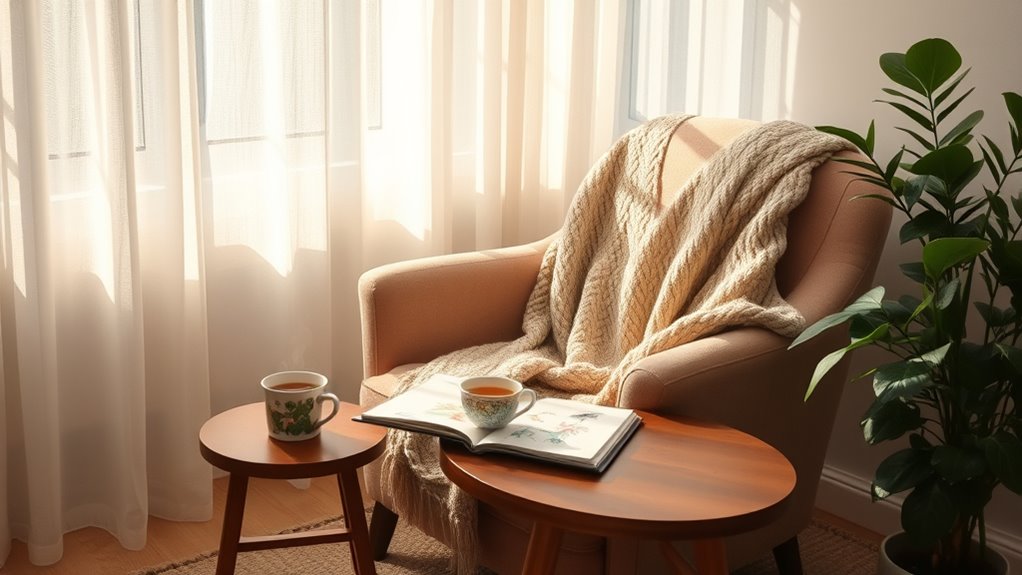After a long day, try engaging in relaxing hobbies like mindfulness meditation or gardening. These activities help you unwind by grounding you in the present moment, reducing stress, and boosting your mood naturally. Meditation requires just a few minutes to clear your mind, while gardening connects you with nature and promotes calmness. Both are accessible and easy to incorporate into your routine. Keep exploring these options to discover how they can transform your stress relief.
Key Takeaways
- Engage in mindfulness meditation to quickly relax and clear your mind without needing special equipment.
- Practice gardening indoors or on a small balcony to connect with nature and promote calmness.
- Combine physical activity like planting or pruning with mindfulness for enhanced stress relief.
- Dedicate just a few minutes daily to these hobbies to build long-term mental resilience.
- These activities foster a sense of purpose, patience, and present-moment awareness for emotional well-being.

In today’s fast-paced world, finding ways to unwind and de-stress is more important than ever. After a long day, you need activities that help you relax both your mind and body. One highly effective method is mindfulness meditation. It’s simple: you focus on your breath, sensations, or a specific thought, allowing your mind to settle and become more present. This practice doesn’t require any special equipment or a lot of time—just a few minutes can make a significant difference. As you breathe deeply and observe your thoughts without judgment, you’ll notice stress melting away. Over time, mindfulness meditation can improve your overall mental clarity and emotional resilience, making daily stressors easier to handle. Additionally, engaging in spiritual practices like meditation can foster a deeper sense of connection and purpose, further enhancing your well-being.
Another excellent way to de-stress is through gardening therapy. Even if you don’t have a yard, tending to indoor plants or a small balcony garden can provide similar benefits. Gardening therapy involves engaging with plants, soil, and nature, which helps ground you in the present moment. As you plant seeds, water your greens, or prune your flowers, your focus shifts away from worries and deadlines. The physical activity of gardening also releases endorphins, boosting your mood naturally. Plus, nurturing living things fosters a sense of accomplishment and calm that’s hard to find elsewhere. Whether you’re digging in dirt or simply arranging flowers, gardening connects you to nature’s rhythm, helping you forget about stressors and enjoy a peaceful moment.
Both mindfulness meditation and gardening therapy serve as powerful tools to reset your mental state after a stressful day. They encourage you to slow down, breathe, and reconnect with the present. You don’t need a lot of time or space to incorporate these activities into your routine. Even just a few minutes of meditation can clear your mind, while tending to plants offers a tactile, soothing experience. These hobbies are accessible, low-cost, and adaptable to your schedule, making them perfect for busy lives. As you practice mindfulness meditation, you learn to observe your thoughts without attachment, reducing anxiety and promoting relaxation. Meanwhile, gardening therapy nurtures your sense of patience and care, reinforcing a calm, centered mindset. Together, these hobbies help you create a sanctuary of peace amid life’s chaos, making everyday stress a little easier to manage.
Frequently Asked Questions
Can Relaxing Hobbies Improve Mental Health Long-Term?
You might wonder if relaxing hobbies can boost your long-term mental health. Engaging in activities like mindfulness meditation and journaling offers proven benefits, such as reducing stress, improving emotional regulation, and fostering self-awareness. Regularly practicing these hobbies helps build resilience, manage anxiety, and promote a positive outlook. Incorporate them into your routine to support your mental well-being over time, making stress easier to handle and enhancing overall happiness.
Are There Hobbies Suitable for All Age Groups?
Many hobbies are suitable for all age groups, promoting intergenerational activities and hobby accessibility. You can enjoy activities like gardening, storytelling, or arts and crafts that encourage family bonding and are easy to adapt for different ages. These hobbies help bridge generations, making them inclusive and enjoyable, ensuring everyone can participate regardless of age or ability. So, you’ll find plenty of options to connect and relax across all age ranges.
How Much Time Should I Dedicate to Relaxing Hobbies Daily?
Your daily downtime is more precious than gold, so time management is key. Aim for at least 20-30 minutes of relaxing hobbies to help you unwind, but feel free to extend it if you have the time. Incorporate a variety of hobbies—like reading, gardening, or meditation—to keep things fresh and enjoyable. Remember, consistency matters more than duration, so find a balance that fits your schedule and keeps stress at bay.
Can Relaxing Hobbies Help With Sleep Issues?
Relaxing hobbies can indeed help with sleep issues by promoting stress reduction and calming your mind before bed. When you engage in activities like reading, gentle yoga, or listening to soothing music, you lower your stress levels, which improves sleep quality. By making time for these hobbies regularly, you create a peaceful pre-sleep routine that helps you fall asleep faster and enjoy more restful nights.
Are Some Hobbies More Cost-Effective Than Others?
When considering hobby affordability, you’ll find some options are more budget-friendly than others. A quick cost comparison shows that activities like reading or gardening often cost less than sports or arts classes. You can enjoy relaxing hobbies without overspending by choosing low-cost or free options. So, yes, some hobbies are more cost-effective, allowing you to de-stress without breaking the bank, making it easier to maintain a regular relaxing routine.
Conclusion
Incorporating relaxing hobbies into your routine can substantially reduce stress and improve your overall well-being. Did you know that over 70% of adults who engage in leisure activities report feeling happier and more relaxed? Whether it’s reading, gardening, or listening to music, these simple activities help you unwind and recharge. Make time for yourself daily—you’ll notice the positive difference in your mood and energy levels. Prioritize relaxation, and enjoy a healthier, more balanced life.










